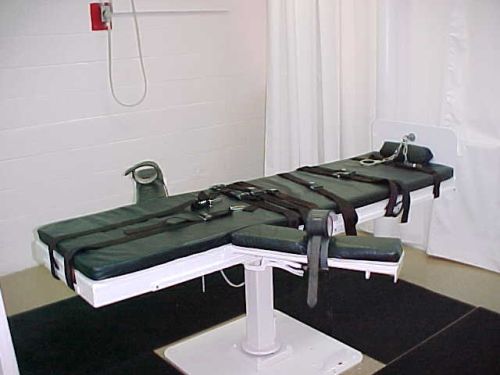Lafourche adds to public housing stock
February 5, 2014Locals weigh in on death penalty procedures
February 5, 2014Hearings on the question of whether Chad Roy Louviere should have a new trial in connection with the 1996 hostage standoff that claimed the life of a Houma bank employee continued this week, with the potential of any decision still a long way off.
But a major element of Louviere’s case – and those of other convicted killers on Louisiana’s death row – could be subject to radical change.
Rep. Joseph Lopinto (R-Metairie) – chairman of the House Criminal Justice Committee – is the first lawmaker to publicly state that he is considering a bill that would return electrocution as Louisiana’s legal death penalty protocol.
The problem is that Louisiana – and other states – are having difficulty obtaining preferred drugs for the lethal injection method, because their manufacturers do not want them associated with the killing of people.
That has resulted in states using other drug options, most of them untried.
In Ohio last month, a mixture of midazolam and hydromorphone was used to execute convicted killer and rapist Dennis McGuire. It took 26 minutes for McGuire to die, and witnesses reported that McGuire struggled for about 10 minutes.
An execution was scheduled today in Louisiana for Christopher Sepulvado. Sepulvado’s crime was vicious. He was convicted of fatally beating and scalding his 6-year-old stepson, Wesley Allen Mercer.
Sepulveda was to have been killed with the Ohio drug combination but his attorneys obtained a stay Monday.
“Following a status conference today with Judge James J. Brady, the parties agreed to a 90-day temporary restraining order,” said Department of Corrections spokeswoman Pam Laborde. “The stay will allow additional time for review and responses to outstanding issues related to the execution. A trial on the constitutionality of the state’s execution protocol is scheduled to begin April 7, 2014. The state anticipates a formal written order from the court later today. The department has been committed throughout the entire process to following the court’s direction, and carrying out the sentence humanely and in accordance with the law.”
But that doesn’t solve the problem of what Louisiana will do in the future.
Lopinto said he has been in touch with corrections department officials and is ready to craft a bill that would return the electric chair to active use. The electric chair has never been completely ruled cruel or unusual enough to violate the 8th amendment ban on cruel and unusual punishment.
“When a death warrant is issued the Department of Corrections needs to be able to fulfill that death order,” Lopinto said. “They would rather and I would rather have lethal injection but in order to have lethal injection we have to rely on third party pharmacy compounders to supply us with the narcotics. The atmosphere for those pharmacies is they are reluctant to supply them for these purposes. If it is ruled that in the future you cannot get the next approved narcotic, then we need an alternative.”
Lopinto said his purpose is not to debate the death penalty. But the legislature needs to give DOC procedures that will allow them to carry out lawful court orders. Reverting to the electric chair, he acknowledges, would indeed be a “step backward.” But the state’s inability to obtain proper drugs for execution, he said, would appear to make that step necessary.
A return to electrocution could also affect other defendants in high-profile local cases who have not been tried yet. In St. Mary Parish Wilbert Thibodeaux faces a potential death penalty for the murder of Chitimacha Police Sgt. Rick Riggenbach. He has a hearing on the question of whether he should have a sanity commission appointed Thursday. In Lafourche Parish prosecutors are seeking the death penalty for Jeremiah Wright, accused of decapitating his son.
New Orleans attorney Sarah Ottinger, executive director of the Capital Appeals Project, represents Louviere in his bid for a new trial and will be involved with conferences scheduled in Houma regarding his case.
The post-conviction relief hearings being held for the already condemned Louviere are expected to continue for months. It is too soon to know how a switch in the lethal injection protocol or reverting to the electric chair might affect his case, or those of the other 80 men and two women currently sentenced to die. Ottinger has argued in court briefs against the constitutionality of lethal injection overall, and that was before the current controversy arose.
But a discussion with her indicates that reverting to Gruesome Gertie might be easier said than done.
“The bottom line is that there is a constitutional standard that gets applied to assessing particular methods of execution and that is what evolving standards of decency are,” Ottinger said. “The last two decades have proven that this society no longer accepts electrocution as a humane method of execution. The U.S. Supreme Court says that when we look at a particular method we have to take in evolving standards of decency in our society and we appear to be devolving. Inflicting the maximum amount of torture is not constitutional and if that is what you wish to do, then you might want to go live in a Third World country.”
Louisiana’s lethal injection table in the death-house of the State Penitentiary at Angola, which replaced the electric chair 23 years ago. The chair is now in a museum on the prison grounds.







